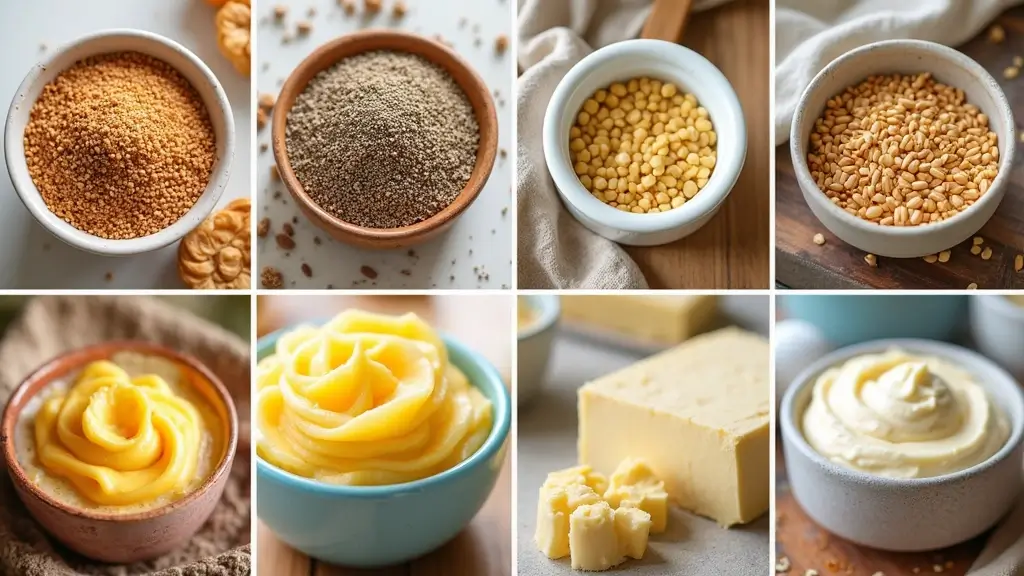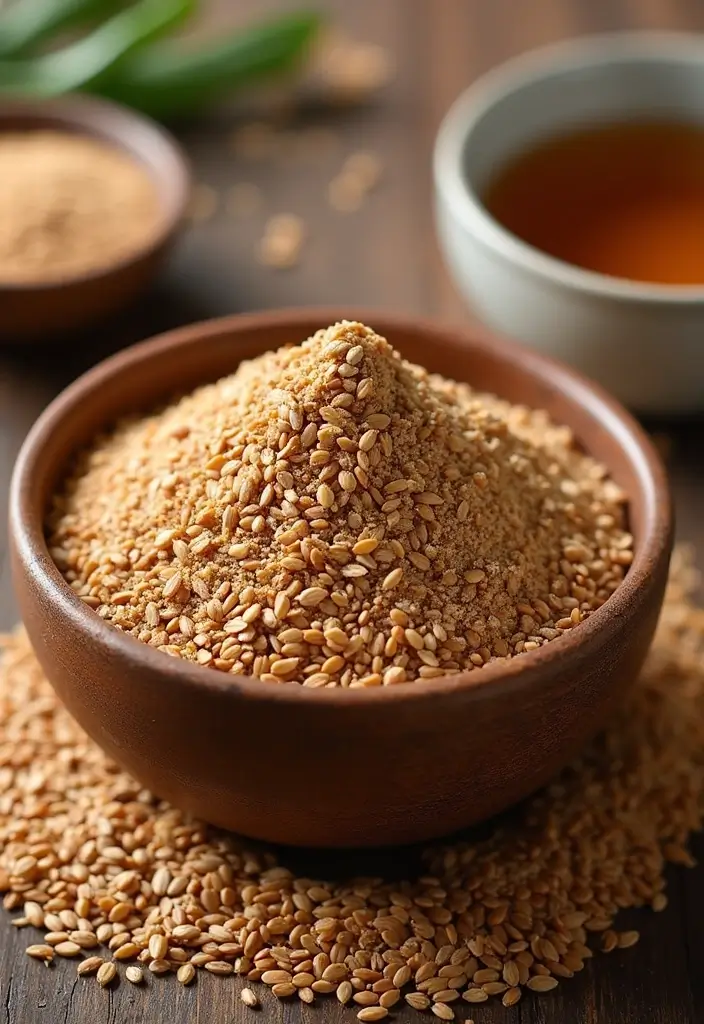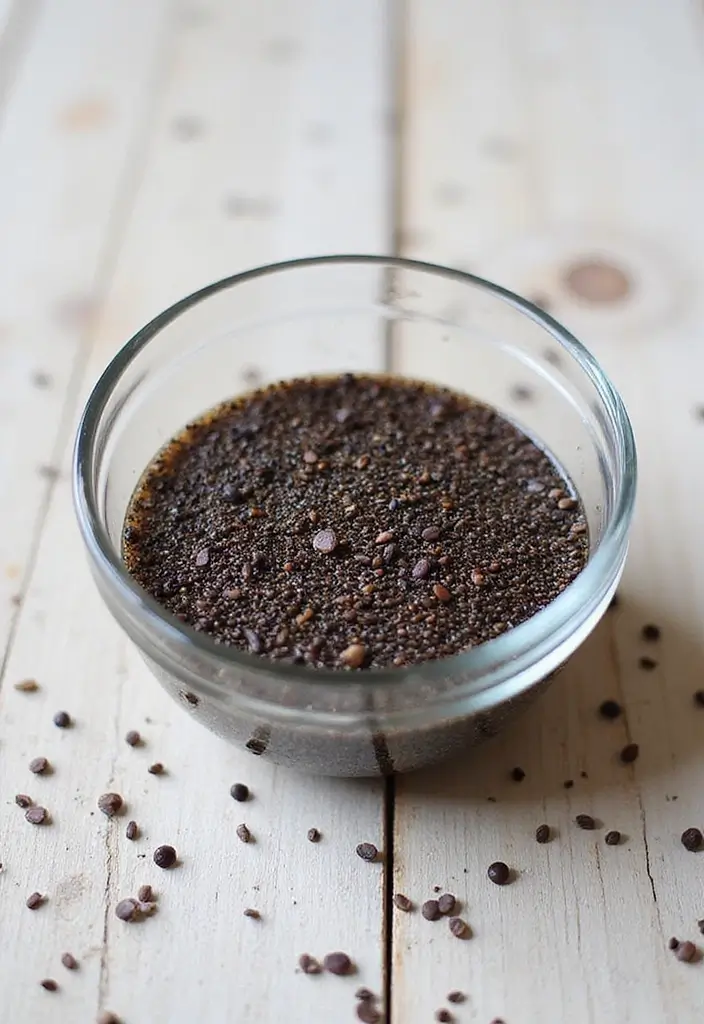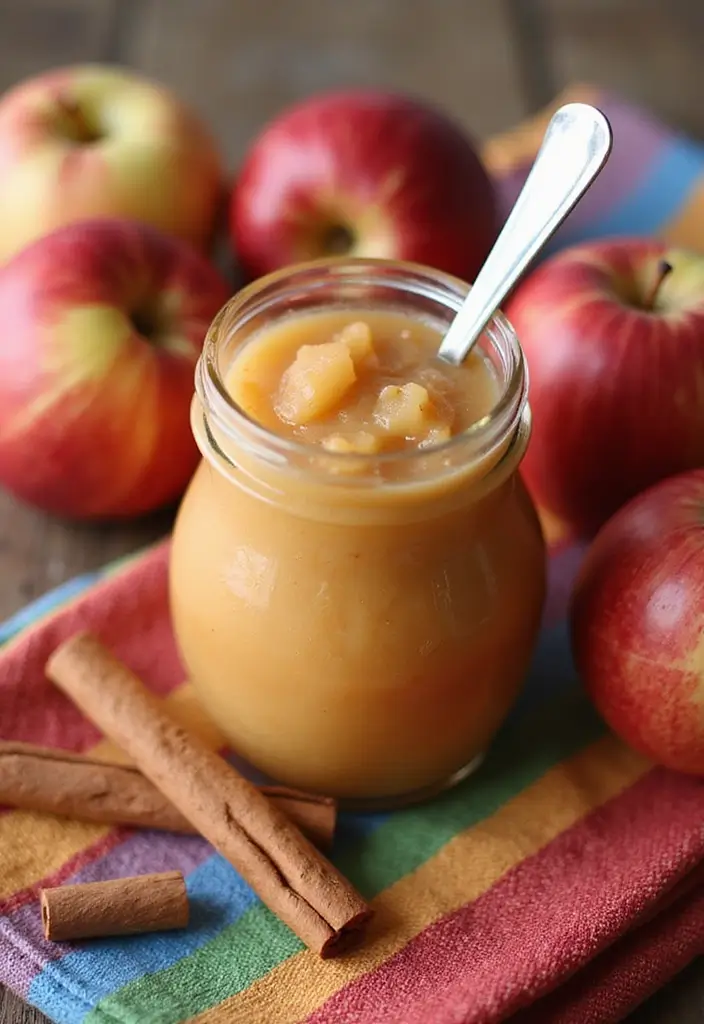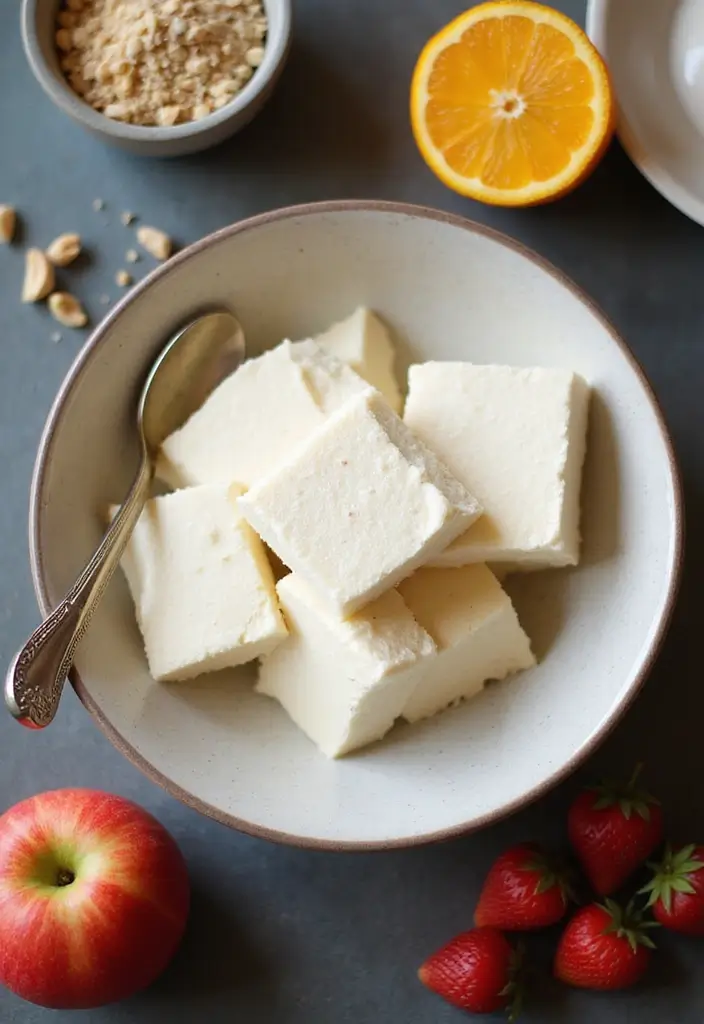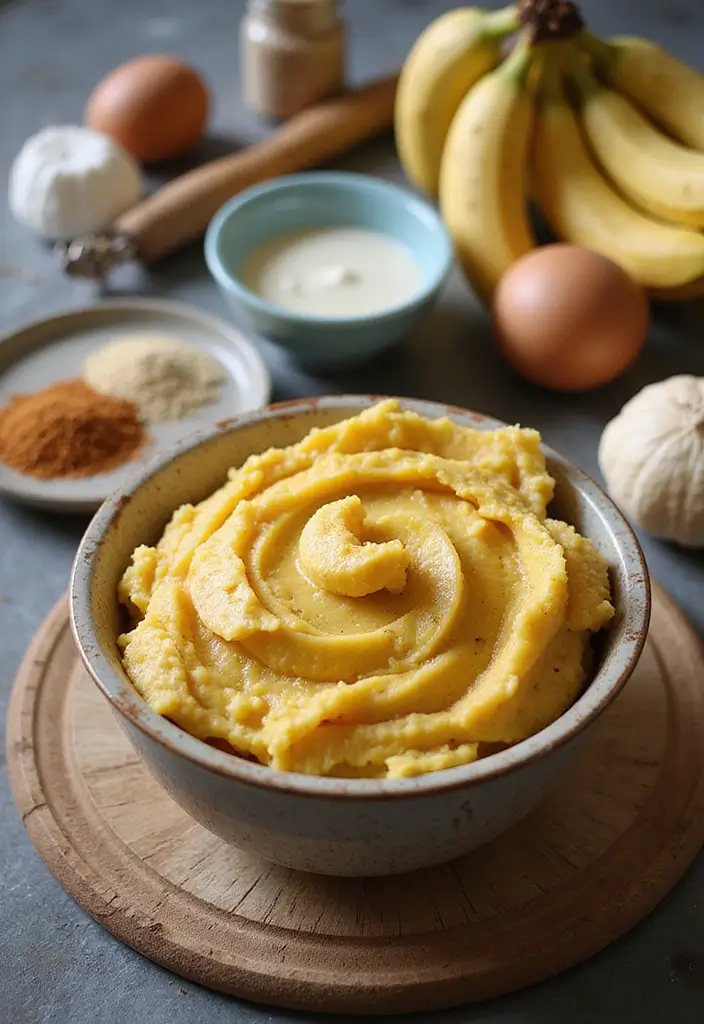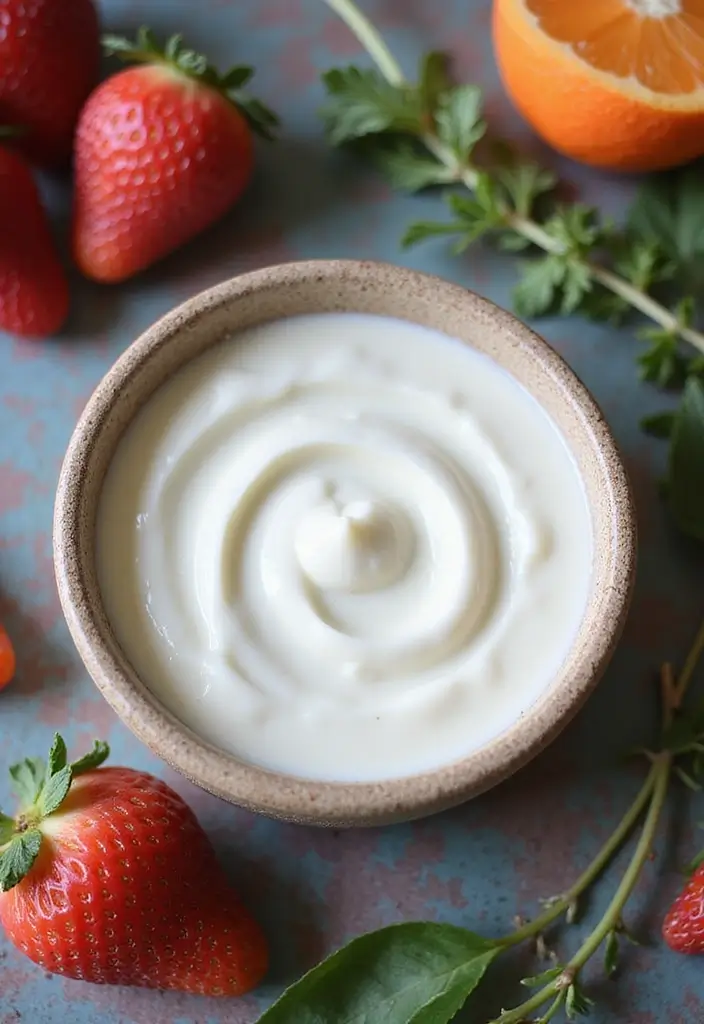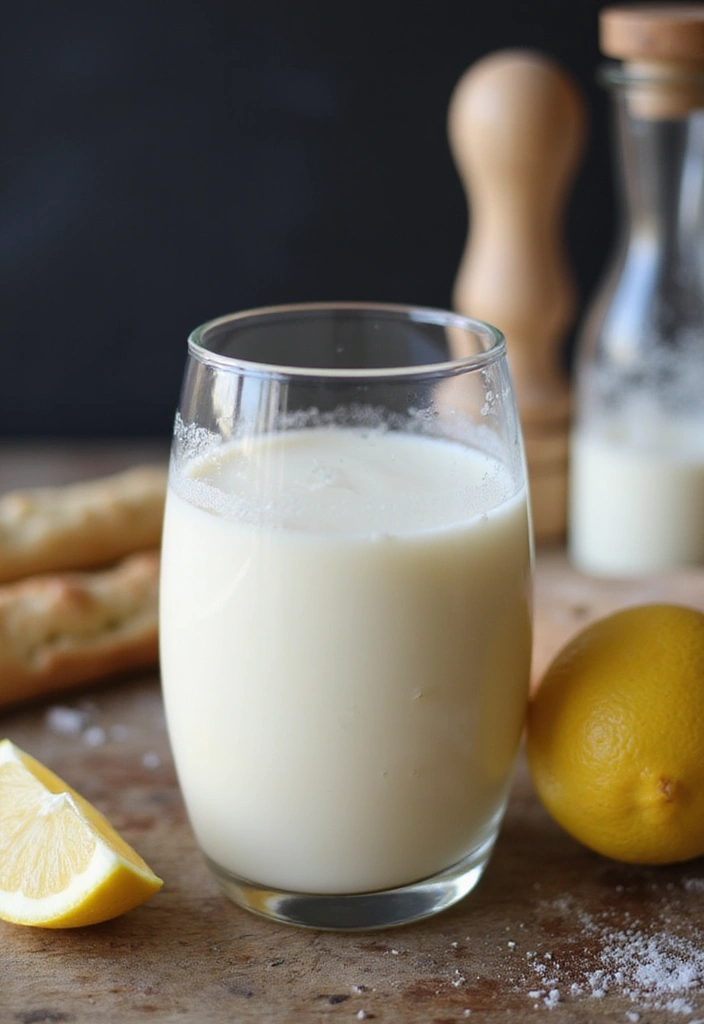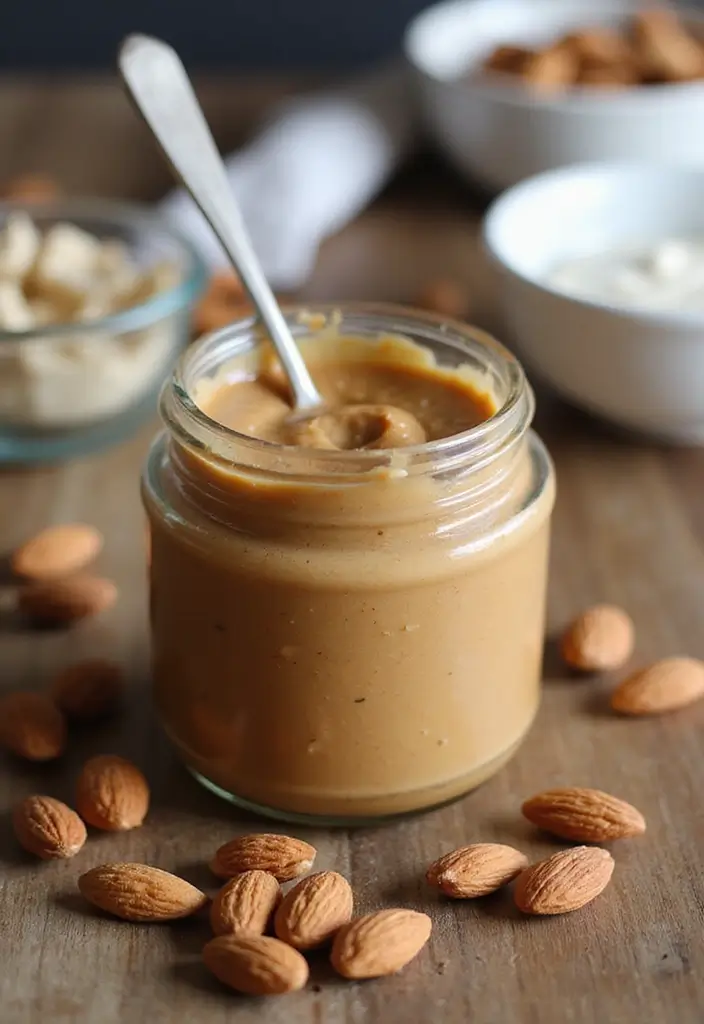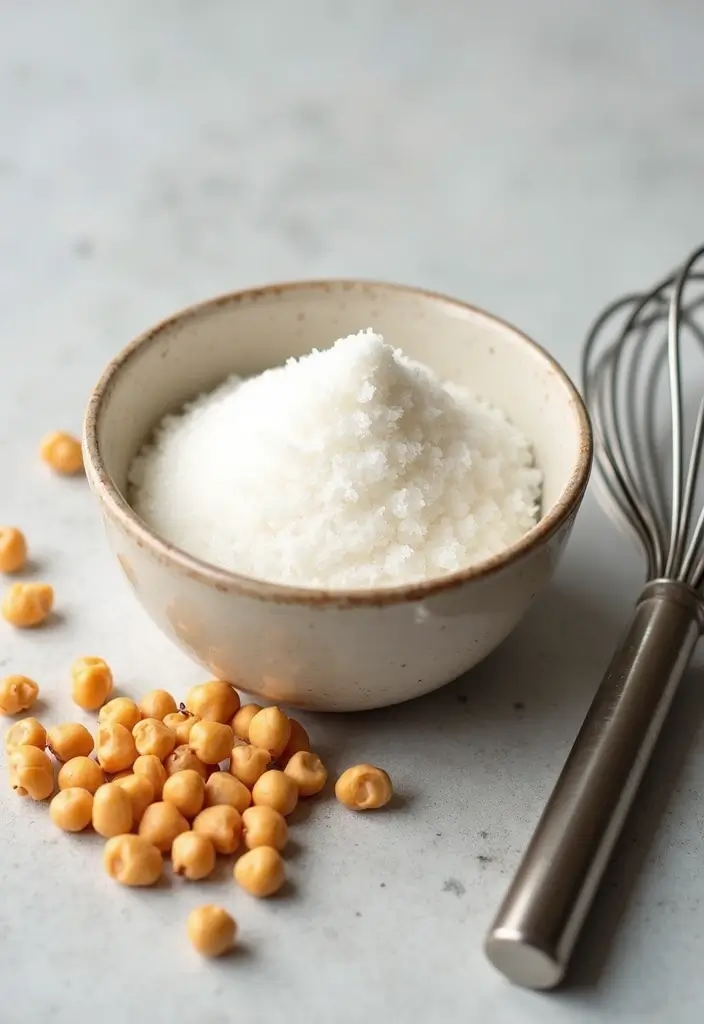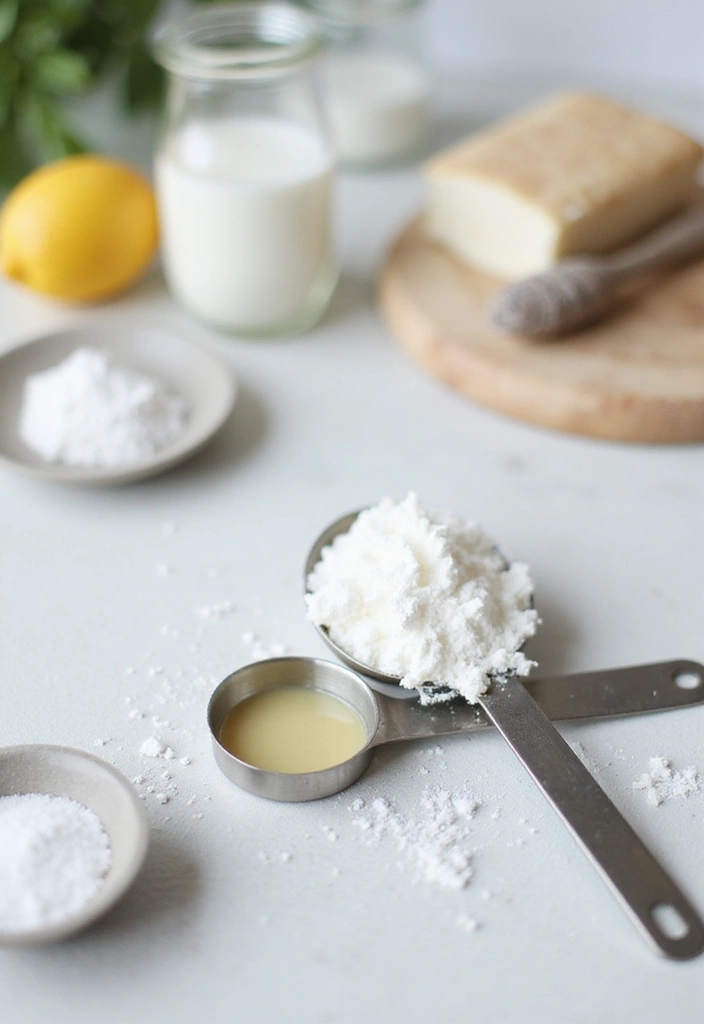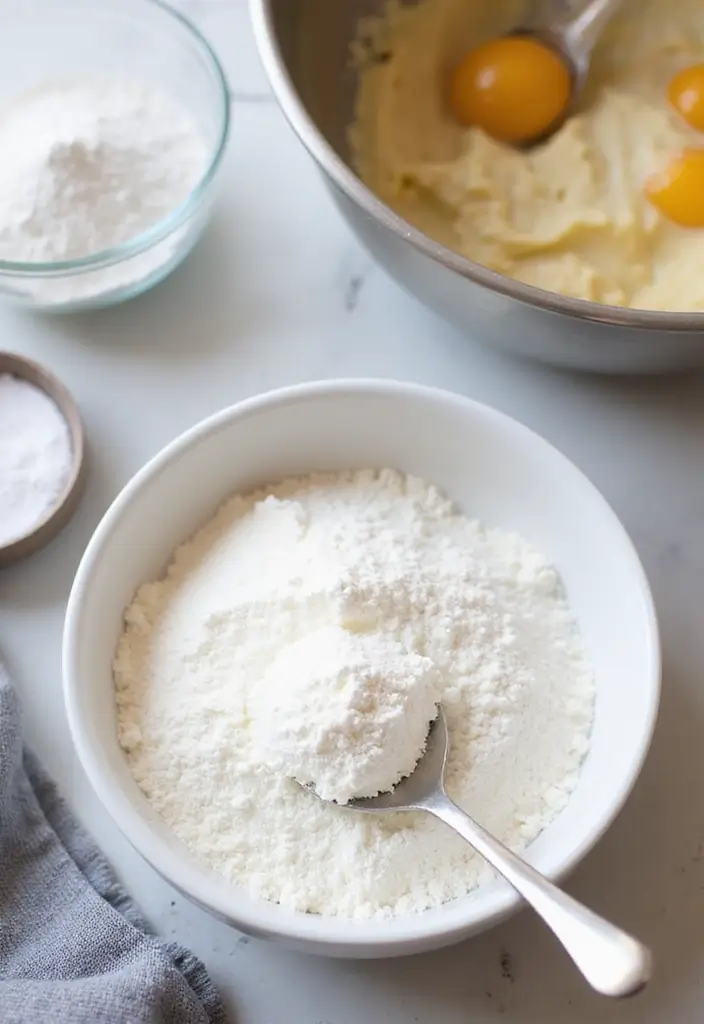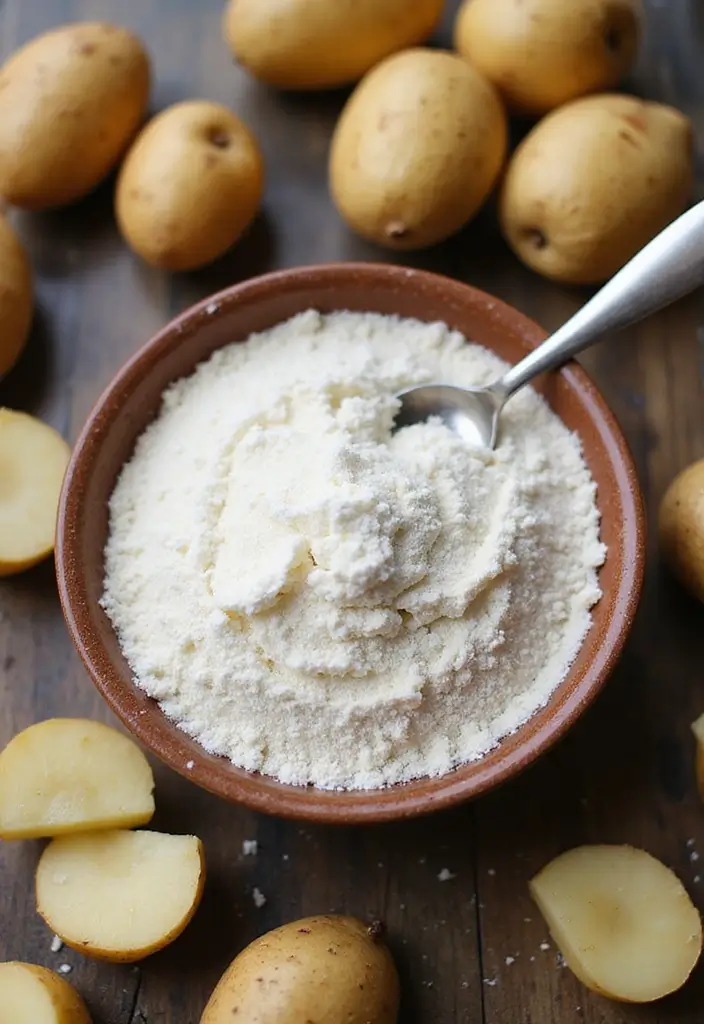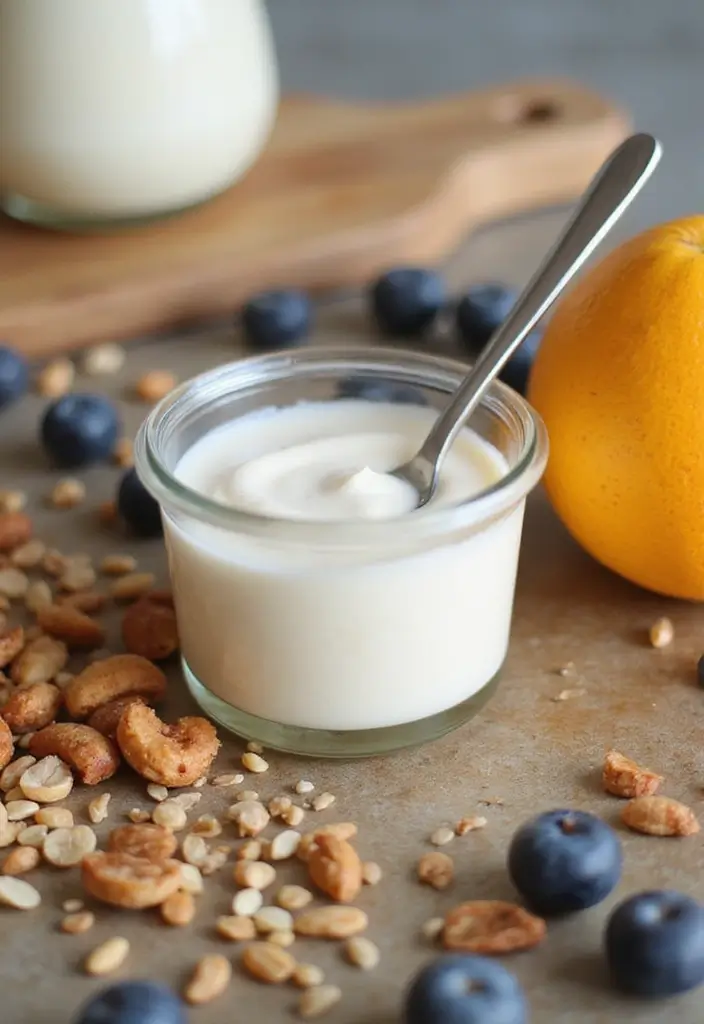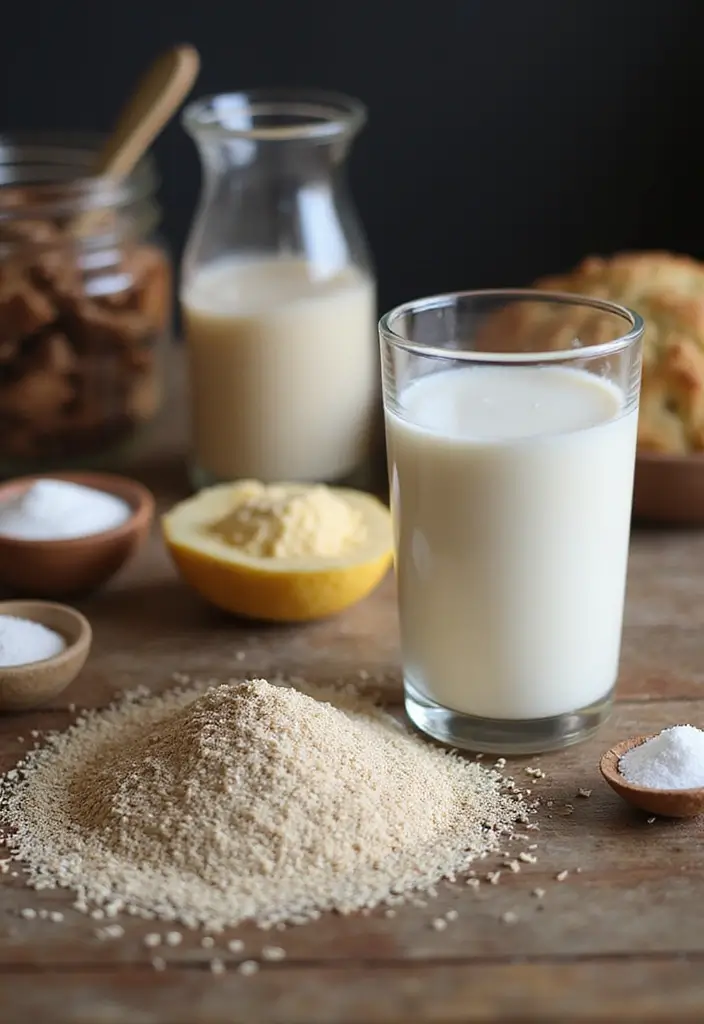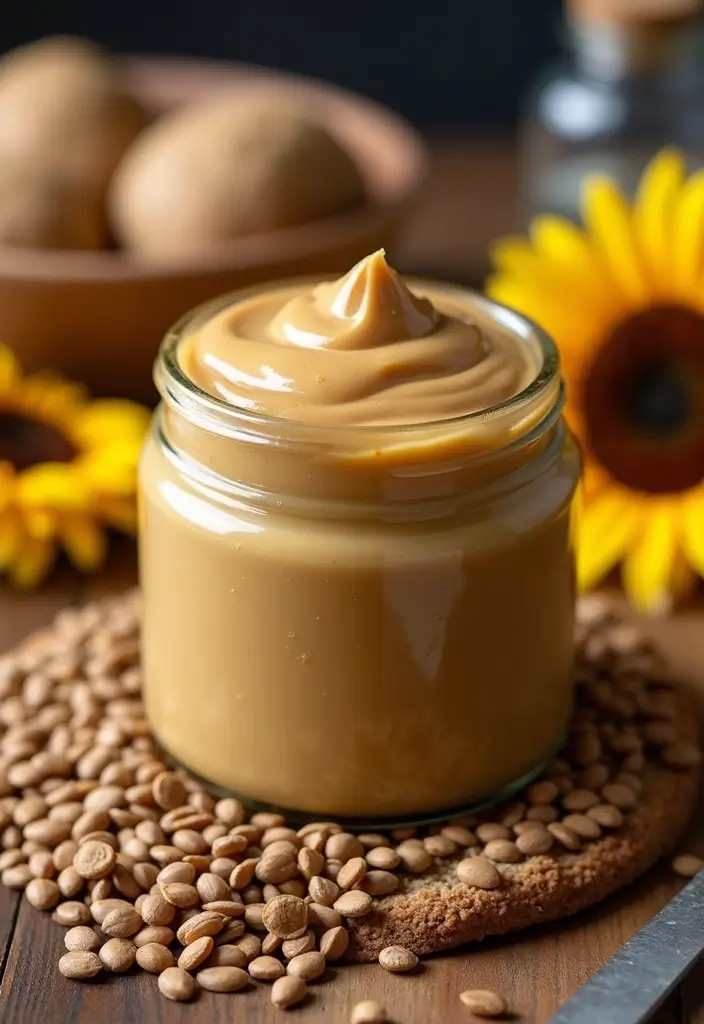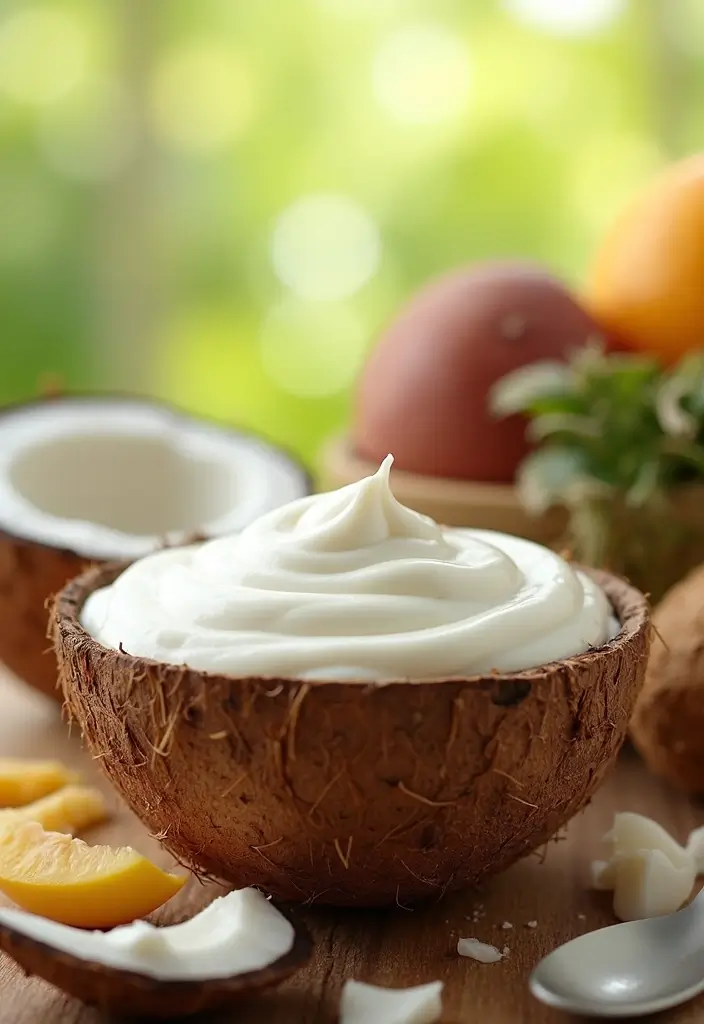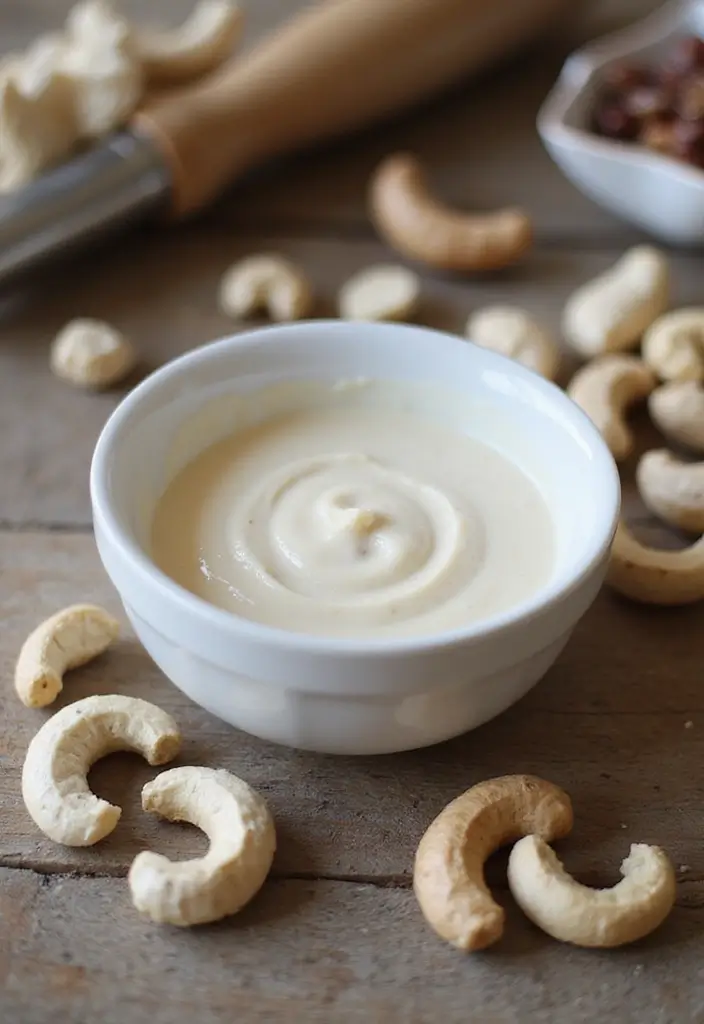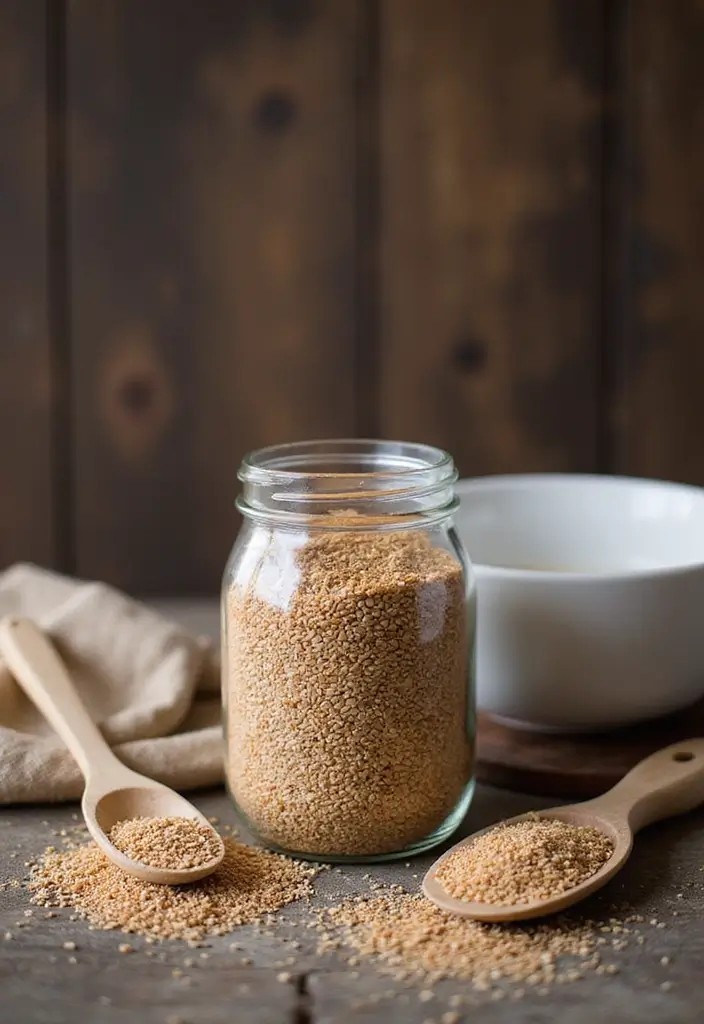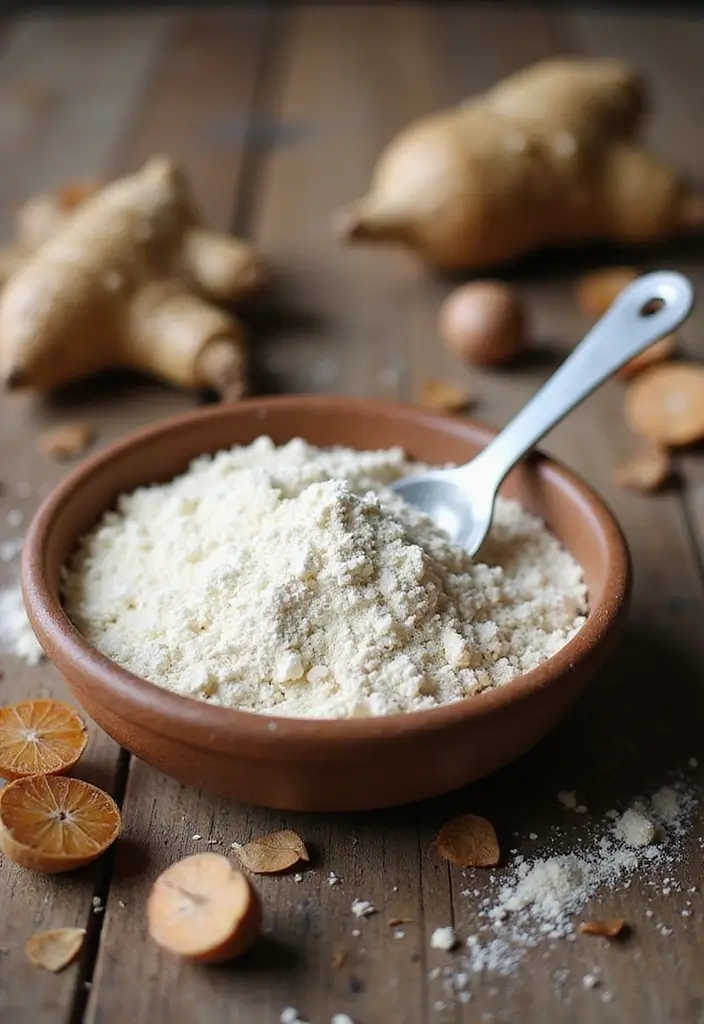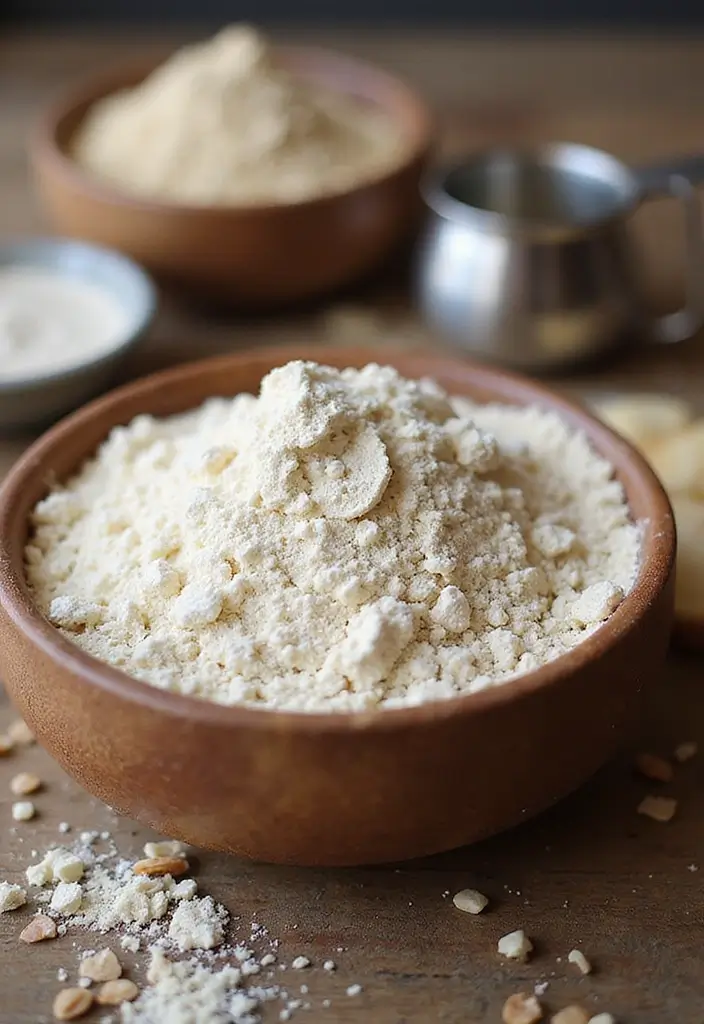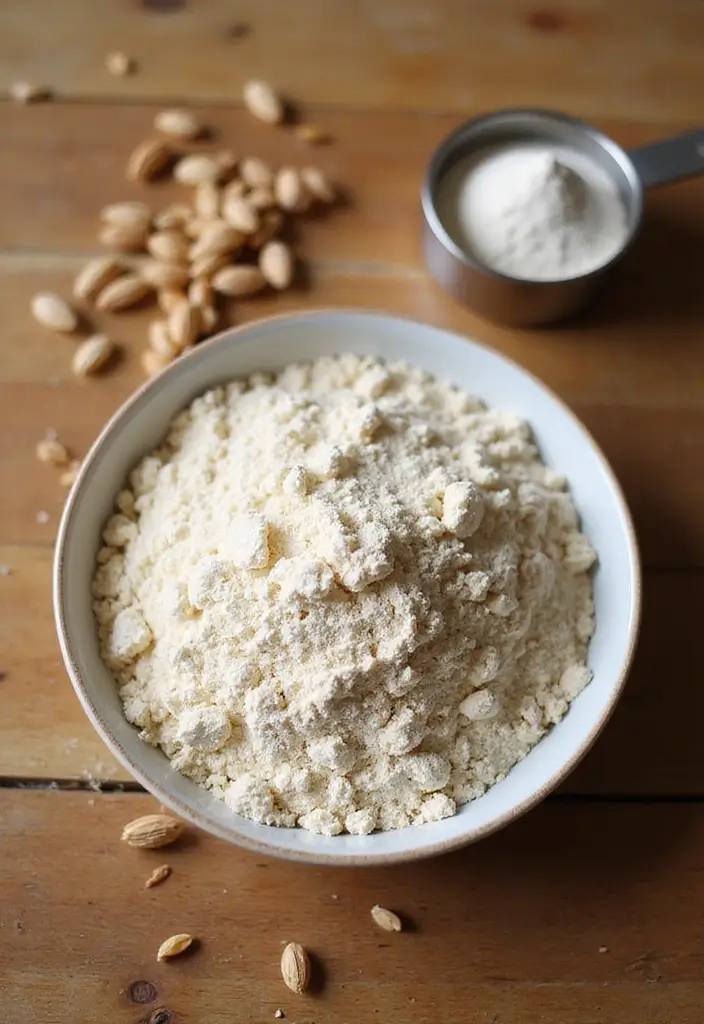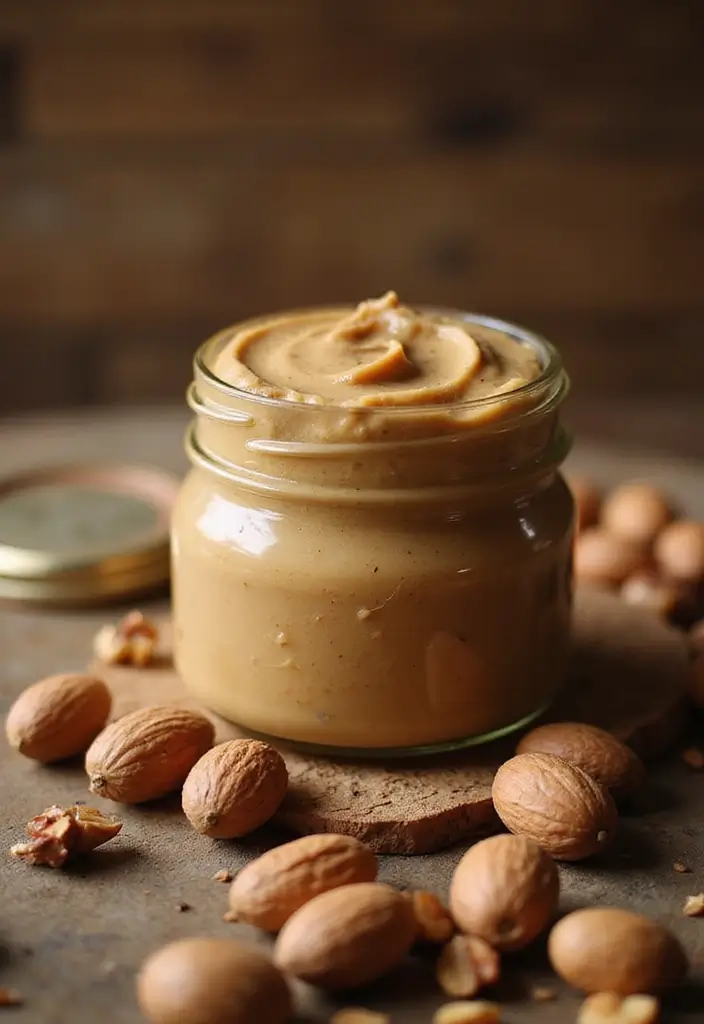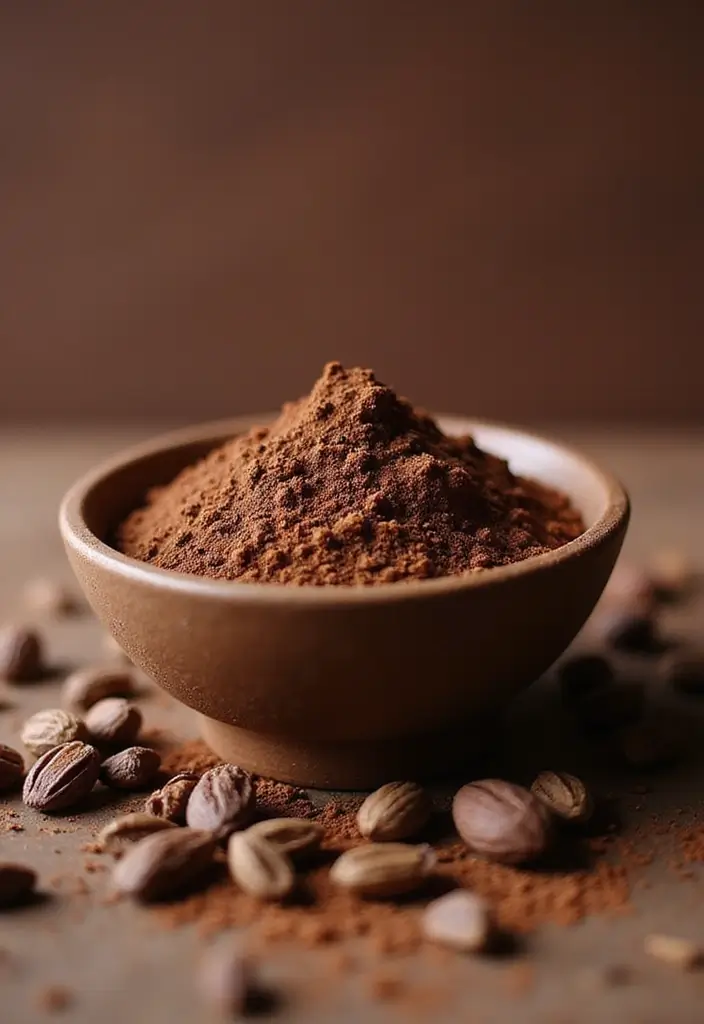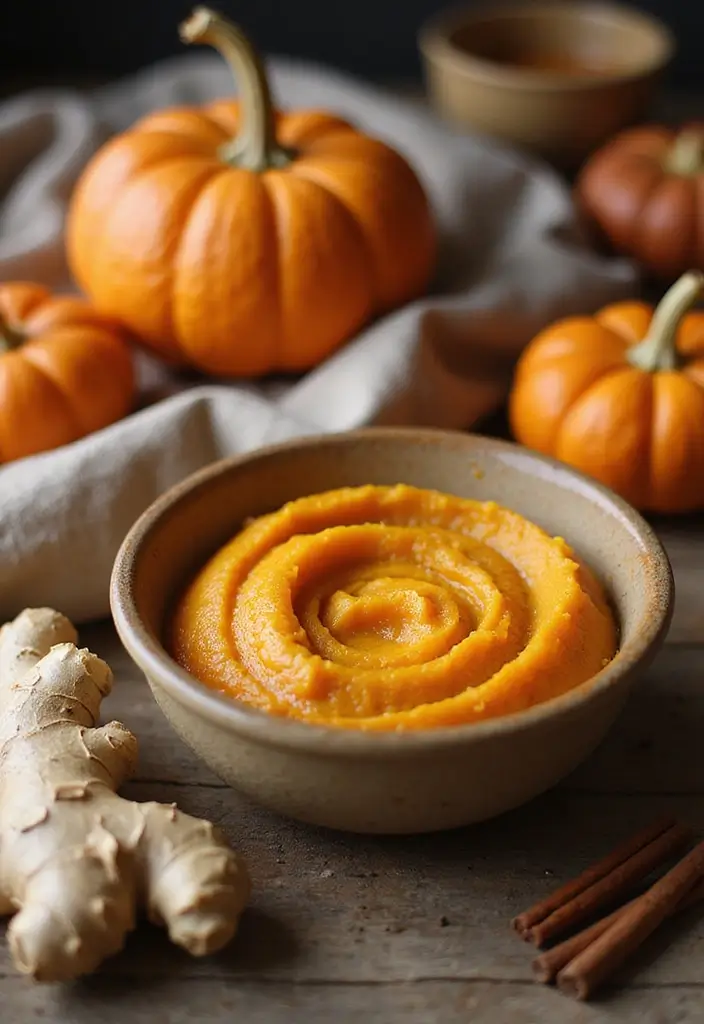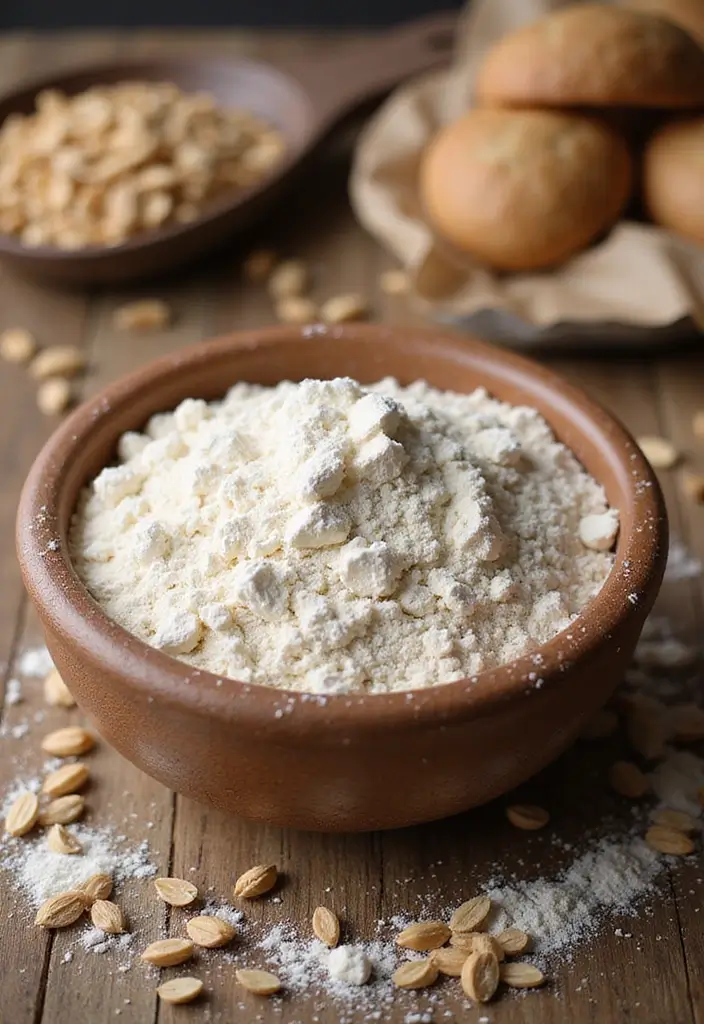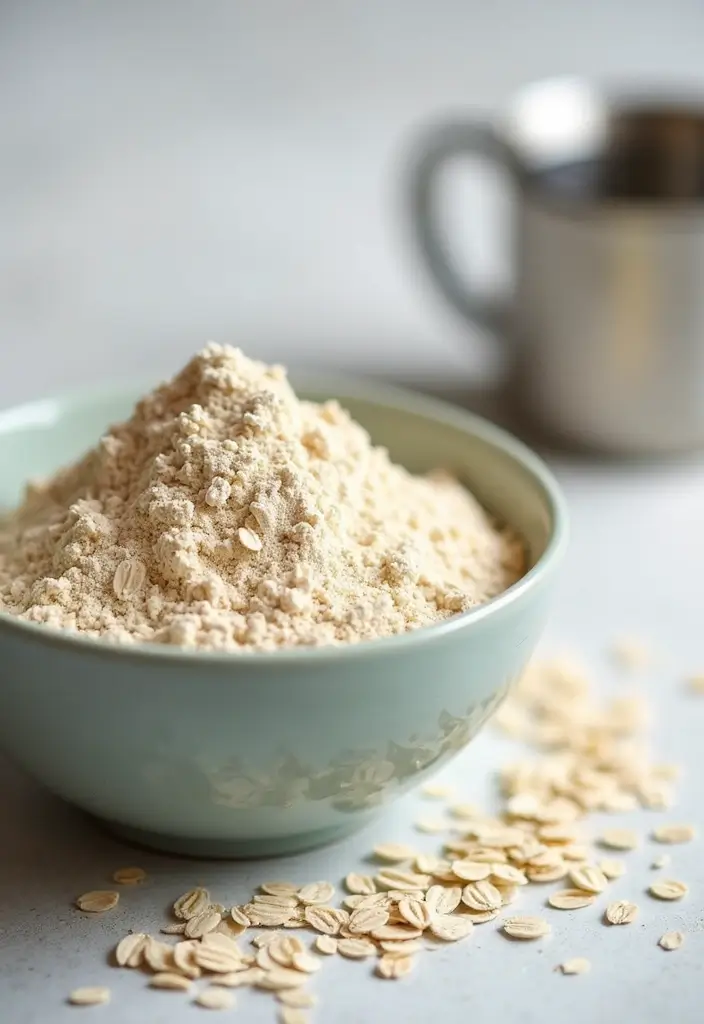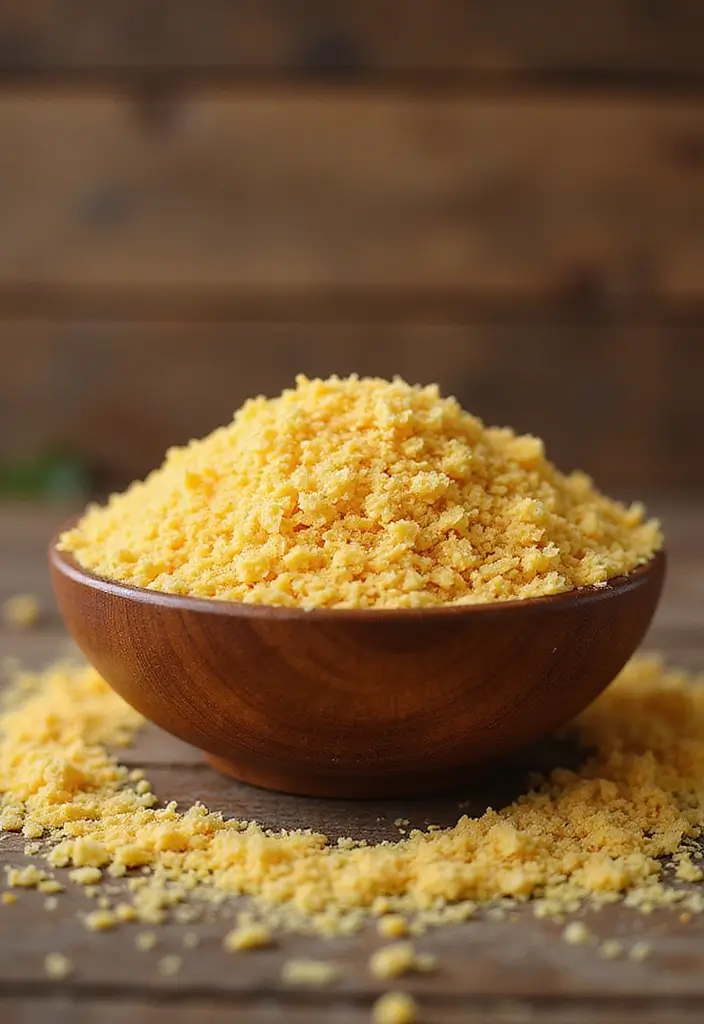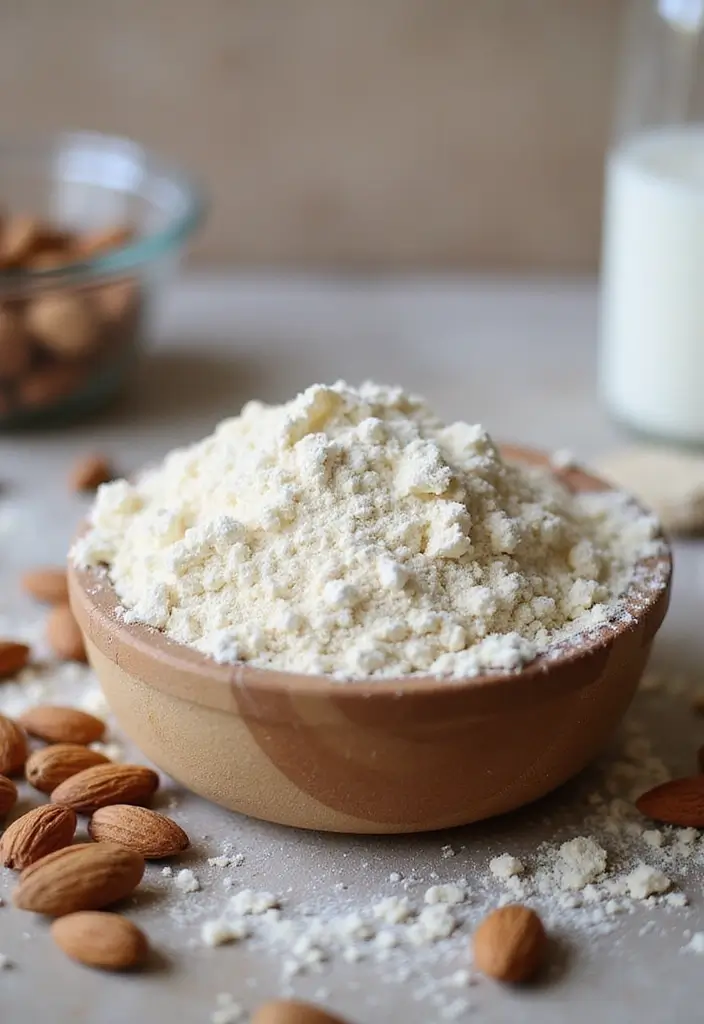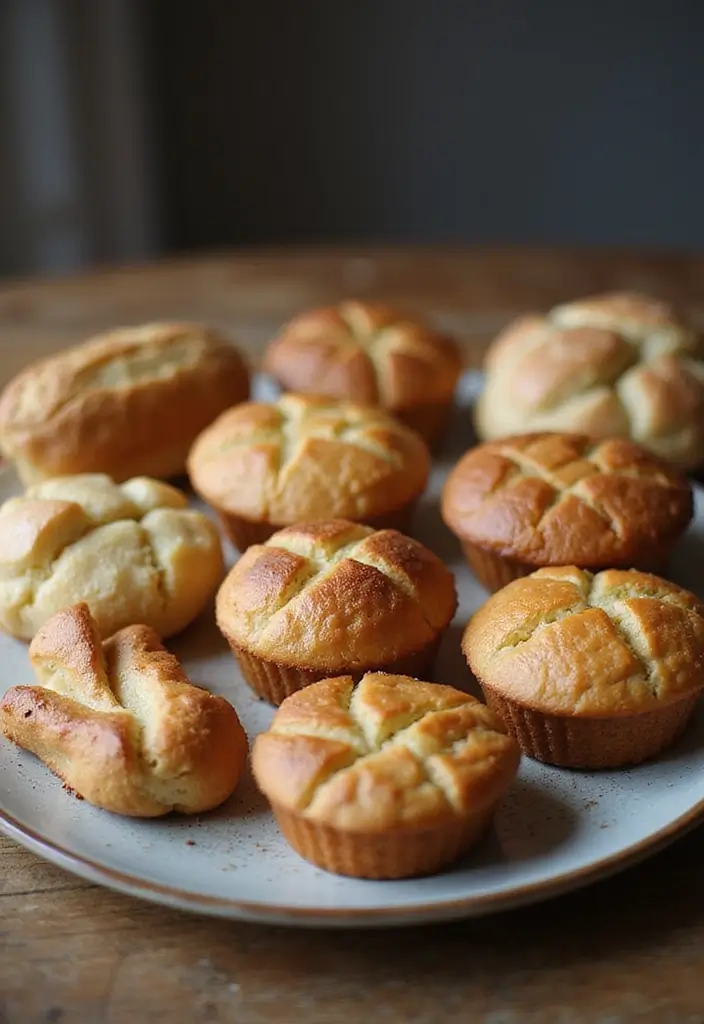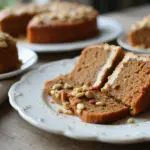Baking without eggs can be a delightful adventure! Whether you’re vegan, have allergies, or just ran out of eggs, there are so many alternatives that can get you baking delicious treats.
From fluffy cakes to chewy cookies, these egg replacements open up a world of possibilities in the kitchen. You’ll find that each substitute brings its own unique flavor and texture to your baked goods, making every creation special. Get ready to discover some game-changing tricks that will enhance your baking without eggs!
Let’s jump into the best egg substitutes you can use in your next baking project!
1. Flaxseed Meal
Flaxseeds are a powerhouse of nutrients and a fantastic egg substitute. To replace one egg, mix 1 tablespoon of flaxseed meal with 2.5 tablespoons of water and let it sit for about 10 minutes until it gels.
The result? A binding agent that adds a slight nuttiness and a dose of omega-3s to your bake. Perfect for cookies and pancakes, flaxseed meal is a vegan favorite. Don’t forget to grind the seeds for the best consistency!
– Servings: 1 egg replacement
– Prep Time: 5 minutes
– Cook Time: N/A
– Total Time: 5 minutes
– Calories: About 37
Nutritional Information: Rich in fiber, protein, and essential fatty acids.
Tips:
– Adjust the amount based on the recipe’s moisture content.
– Great in muffins and quick breads.
FAQs:
– Can I use whole flaxseeds? It’s best to grind them for maximum effect.
Whether you’re making cookies or bread, flaxseed meal is a versatile choice to keep your baking egg-free while being nutritious!
2. Chia Seeds
Chia seeds, like flaxseeds, can work wonders as an egg replacement. To create a chia egg, mix 1 tablespoon of chia seeds with 2.5 tablespoons of water, then let it sit for 10-15 minutes until it forms a gel-like consistency.
Chia seeds pack a punch of antioxidants, fiber, and protein. They give baked goods a wonderful chewiness and are particularly delightful in brownies and cookies. Plus, they’re nearly tasteless, so they won’t interfere with your flavor profile!
– Servings: 1 egg replacement
– Prep Time: 5 minutes
– Cook Time: N/A
– Total Time: 15 minutes
– Calories: About 58
Nutritional Information: High in omega-3 fatty acids, fiber, and plant protein.
Tips:
– Experiment with flavored or colored chia seeds for fun!
– Can be used in muffins and pancakes too.
FAQs:
– Do chia seeds need to be ground? No, but they do need to be hydrated.
Chia seeds make for an exciting and nutritious alternative in your baking adventures!
3. Applesauce
Applesauce is a fantastic egg substitute that adds moisture and sweetness to your baked goods. Use 1/4 cup of unsweetened applesauce to replace one egg.
This is an excellent option for cakes, muffins, and pancakes, giving them a lovely tenderness without the eggy flavor. It’s also a perfect way to sneak in some extra fruit into your diet! Don’t forget to adjust sugar levels in your recipe, as applesauce is naturally sweet.
– Servings: 1 egg replacement
– Prep Time: 5 minutes
– Cook Time: N/A
– Total Time: 5 minutes
– Calories: About 25
Nutritional Information: Low in calories while providing dietary fiber.
Tips:
– Select unsweetened applesauce for better control over sweetness.
– Add cinnamon to enhance its flavor in desserts.
FAQs:
– Can I use flavored applesauce? Yes, but it may alter the taste slightly.
Applesauce not only helps your baked goods rise but also gives them a delicious fruity undertone!
4. Silken Tofu
When it comes to creating a rich, moist texture in baked goods, silken tofu is an incredible choice. To replace one egg, blend 1/4 cup of silken tofu until smooth.
This substitute works beautifully in brownies, cakes, and cheesecakes, providing an almost creamy consistency while being packed with protein. It has a neutral flavor, ensuring it won’t overpower your other ingredients. Plus, it’s an excellent option for those looking for a dairy-free substitute!
– Servings: 1 egg replacement
– Prep Time: 5 minutes
– Cook Time: N/A
– Total Time: 5 minutes
– Calories: About 45
Nutritional Information: High in protein and low in carbs.
Tips:
– Blend it thoroughly for the best results.
– Works well in dense recipes like brownies and pancakes.
FAQs:
– Can I use regular tofu? Silken tofu is best for its creamy consistency.
Silken tofu opens up a whole new texture to your baking without the use of eggs, ensuring your treats remain delectably moist!
5. Banana Puree
Banana puree is another sweet and fruity egg substitute that adds moisture and flavor. Use 1/4 cup of mashed ripe banana for each egg you want to replace.
This option works wonders in pancakes, muffins, and quick bread, imparting a subtle banana flavor that pairs beautifully with chocolate. Just make sure your bananas are nice and ripe for the best taste! Plus, it adds fiber and potassium to your baked goods, making them a bit healthier.
– Servings: 1 egg replacement
– Prep Time: 5 minutes
– Cook Time: N/A
– Total Time: 5 minutes
– Calories: About 50
Nutritional Information: Contains natural sugars and vitamins.
Tips:
– Balance the recipe’s sweetness since bananas are naturally sweet.
– Best suited for sweet treats rather than savory dishes.
FAQs:
– Can I use frozen bananas? Yes, simply thaw and mash them first!
Banana puree not only serves as an egg replacement but also adds a delightful flavor twist to your baked goods!
6. Yogurt (Dairy-Free)
Dairy-free yogurt has become a popular vegan alternative in baking and can effectively replace eggs! Use 1/4 cup of dairy-free yogurt for each egg you’re substituting.
This replacement works best in cakes and muffins, providing moisture while keeping them tender. You can opt for coconut, almond, or soy yogurt, each giving a slight variation in flavor. Yogurt also adds probiotics to your treats, making them a bit healthier too!
– Servings: 1 egg replacement
– Prep Time: 5 minutes
– Cook Time: N/A
– Total Time: 5 minutes
– Calories: About 50
Nutritional Information: Provides calcium and beneficial bacteria.
Tips:
– Choose plain yogurt for less flavor interference.
– Ideal for both sweet and savory baking.
FAQs:
– Can I use flavored yogurt? It’s best to stick with plain for baking.
Dairy-free yogurt is your go-to for keeping your baked goods fluffy while staying egg-free!
7. Buttermilk (Plant-Based)
Plant-based buttermilk is an excellent option for baking fluffy pancakes or moist cakes while keeping everything vegan. To make your own, combine 1 cup of plant milk with 1 tablespoon of lemon juice or vinegar and let it sit for 10 minutes.
Using this as a substitute for eggs adds a lightness and a bit of tang, mimicking the dairy version’s properties. It’s perfect for recipes that call for eggs to provide moisture without the heaviness.
– Servings: 1 egg replacement
– Prep Time: 10 minutes
– Cook Time: N/A
– Total Time: 10 minutes
– Calories: About 40-60 (depending on milk used)
Nutritional Information: Provides a non-dairy source of calcium and balance in flavors.
Tips:
– Use almond milk or soy milk based on your preference.
– Ideal for cakes, pancakes, and bread.
FAQs:
– Can I use regular milk instead? Yes, but it won’t be vegan anymore!
By adding plant-based buttermilk, you enhance the texture and flavor of your bakes while sticking to your plant-based lifestyle!
8. Nut Butters
Nut butters like almond, cashew, or peanut butter can serve as a terrific egg substitute in baking recipes. Use 3 tablespoons of nut butter to replace one egg.
This adds a rich and nutty flavor to your cookies, brownies, and even pancakes while providing healthy fats and proteins. Nut butter works especially well in recipes where you want to enhance the flavor, like chocolate chip cookies or energy bars. Just be cautious of the salt content in store-bought versions!
– Servings: 1 egg replacement
– Prep Time: 5 minutes
– Cook Time: N/A
– Total Time: 5 minutes
– Calories: About 100
Nutritional Information: High in healthy fats, protein, and fiber.
Tips:
– Choose natural nut butters without added sugars or oils.
– Works best in recipes that complement nutty flavors.
FAQs:
– Will it alter the texture? Yes, it can make things denser, which is great for cookies!
Nut butters are a delicious way to bring your vegan baking to the next level while also packing in nutrients!
9. Aquafaba
Aquafaba, the liquid from canned chickpeas, is a surprising yet fantastic egg substitute! Use 3 tablespoons of aquafaba to replace one egg.
This ingredient is especially great for meringues, whipped toppings, and even cakes, providing an airy texture that’s hard to beat. It’s a must-have for those looking to replicate the fluffiness that eggs typically provide. Just keep in mind that it may alter the flavor slightly, but the end result is often worth it!
– Servings: 1 egg replacement
– Prep Time: 5 minutes
– Cook Time: N/A
– Total Time: 5 minutes
– Calories: About 5
Nutritional Information: Low in calories, high in protein.
Tips:
– Whip aquafaba until fluffy for best results in lighter bakes.
– Ideal for vegan cookies and cakes.
FAQs:
– Can I use the liquid from other beans? Yes, but chickpea liquid is the most effective.
Aquafaba is a game changer, especially if you’re looking to create airy and light pastries without any eggs!
10. Vinegar and Baking Soda
The combination of vinegar and baking soda can provide a leavening effect similar to eggs. Mix 1 tablespoon of vinegar (white or apple cider) with 1 teaspoon of baking soda to replace one egg.
This method works wonders in pancakes, cakes, and cupcakes, creating a light and fluffy texture without any egg. Just ensure you incorporate this mixture gently into your batter to avoid losing the airiness!
– Servings: 1 egg replacement
– Prep Time: 5 minutes
– Cook Time: N/A
– Total Time: 5 minutes
– Calories: About 10
Nutritional Information: Minimal calories, primarily from baking soda.
Tips:
– Use this combo in recipes where eggs provide leavening.
– Be careful not to overmix the batter.
FAQs:
– Can I use different types of vinegar? Any vinegar works, but taste may vary slightly.
This vinegar and baking soda trick can keep your baked goods light and airy, perfect for those fluffy creations!
11. Cornstarch
Cornstarch can serve as an excellent binding agent in baking. To replace one egg, mix 2 tablespoons of cornstarch with 3 tablespoons of water.
This is especially useful in cakes and cookies, where it adds structure without disrupting flavors. Cornstarch creates a smooth texture and keeps baked goods from drying out, making it ideal for those looking to maintain moisture in their treats!
– Servings: 1 egg replacement
– Prep Time: 5 minutes
– Cook Time: N/A
– Total Time: 5 minutes
– Calories: About 30
Nutritional Information: Mostly carbohydrates with minimal protein or fat.
Tips:
– Can help achieve a nice crumb in cakes and cookies.
– Great for gluten-free baking as well!
FAQs:
– Is cornstarch safe for people with allergies? Yes, as long as they’re not allergic to corn.
Cornstarch is a straightforward solution for achieving delightful textures in your baking without the need for eggs!
12. Potato Starch
Potato starch is another binding agent that can flawlessly replace eggs in baking. Use 2 tablespoons of potato starch mixed with 3 tablespoons of water to substitute for one egg.
This helps trap moisture and adds a lovely lightness to cakes and muffins, making your baked goods fluffy and delicious. It’s an excellent choice for gluten-free bakers looking to create soft textures without eggs!
– Servings: 1 egg replacement
– Prep Time: 5 minutes
– Cook Time: N/A
– Total Time: 5 minutes
– Calories: About 30
Nutritional Information: Similar to cornstarch, mostly carbs.
Tips:
– Works well in conjunction with other flours.
– Add it to cakes for extra fluffiness.
FAQs:
– Can I use tapioca starch instead? Yes, tapioca starch can also work as a substitute.
Potato starch gives your baked goods a airy texture while keeping things fresh and egg-free!
13. Soy Yogurt
Soy yogurt works remarkably well as a versatile egg substitute in baking! Replace one egg with 1/4 cup of soy yogurt for moist and fluffy results.
It adds protein and a creamy consistency to your recipes, making it a great option for cakes and muffins. With its neutral flavor, soy yogurt seamlessly blends into your dough or batter, ensuring your bakes remain delicious without egg!
– Servings: 1 egg replacement
– Prep Time: 5 minutes
– Cook Time: N/A
– Total Time: 5 minutes
– Calories: About 50
Nutritional Information: Contains protein and is lower in fat compared to traditional yogurt.
Tips:
– Opt for plain varieties to ensure there are no unexpected flavors.
– Excellent for vegan baking without sacrificing texture.
FAQs:
– Will it change the flavor much? Not significantly, but it’s best to stick with plain flavors to keep it neutral.
Soy yogurt is a fantastic way to keep your baked goods moist and fluffy while being completely vegan!
14. Rice Milk and Flaxseed Mixture
For those who love versatile combinations, creating a mixture of rice milk and flaxseed is an option! Mix 1 tablespoon of ground flaxseed with 3 tablespoons of rice milk to substitute for one egg.
This combination aids in binding while adding moisture, perfect for cakes and pancakes. Rice milk adds a hint of sweetness, making it great for dessert recipes. Just make sure to give it time to become gel-like before adding it to your batter!
– Servings: 1 egg replacement
– Prep Time: 5 minutes
– Cook Time: N/A
– Total Time: 5 minutes
– Calories: About 40
Nutritional Information: Low in calories, with healthy fats from flaxseeds.
Tips:
– Adjust the amount of rice milk based on desired moisture.
– Excellent for vegan desserts!
FAQs:
– Can I use another plant milk? Yes, any non-dairy milk works well!
This blend keeps your baking moist and fluffy, while also being a wholesome egg-free option!
15. Sunflower Seed Butter
Sunflower seed butter is an incredible substitute for those with nut allergies and can replace eggs in recipes easily! Use 3 tablespoons to replace one egg, adding a nutty flavor to your baked goods.
This option is especially good in cookies and bars, giving a unique twist while keeping things allergy-friendly. Sunflower seed butter also packs in vitamins and minerals, making your bakes a bit more nutritious!
– Servings: 1 egg replacement
– Prep Time: 5 minutes
– Cook Time: N/A
– Total Time: 5 minutes
– Calories: About 100
Nutritional Information: Provides healthy fats and protein, with a good dose of vitamins.
Tips:
– Ensure it’s well stirred for a consistent texture.
– Use in recipes where a nutty flavor will complement the dish.
FAQs:
– Can I use sunflower seed butter in sweet recipes? Absolutely, it works great!
Sunflower seed butter is a smart solution for delicious egg-free baking—even for those with nut allergies!
16. Coconut Cream
Coconut cream can serve as a rich and creamy egg substitute in your baking! To replace one egg, use 1/4 cup of coconut cream.
This brings a tropical flavor and creamy texture to your cakes and cookies. It’s perfect for recipes where you want a bit more moisture and richness, and it pairs beautifully with chocolate. Also, coconut cream is a great source of healthy fats, making your bakes a bit more nutritious.
– Servings: 1 egg replacement
– Prep Time: 5 minutes
– Cook Time: N/A
– Total Time: 5 minutes
– Calories: About 100
Nutritional Information: Rich in healthy fats, low in carbs.
Tips:
– Use full-fat coconut cream for best results.
– Delicious in chocolate cakes and creams.
FAQs:
– Is it dairy-free? Yes, it’s completely plant-based!
Coconut cream adds a delightful richness to your baked treats while keeping everything egg-free!
17. Cashew Cream
Cashew cream, made from blended soaked cashews, is an amazing creamy substitute in baking. Use 1/4 cup of cashew cream to replace one egg.
This substitution is perfect for recipes like thick cakes and creamy desserts, giving a rich flavor while keeping everything vegan. The slight nuttiness of cashews can add an extra depth to your treats, making them feel indulgent and luxurious!
– Servings: 1 egg replacement
– Prep Time: 10 minutes (soaking time included)
– Cook Time: N/A
– Total Time: 10 minutes
– Calories: About 100
Nutritional Information: High in healthy fats, protein, and various vitamins.
Tips:
– Soak cashews in water overnight for the best texture.
– Works well in desserts and creamy sauces.
FAQs:
– Can I use other nuts? Yes, but cashews work best for creaminess!
Cashew cream enhances richness in your bakes while keeping them entirely plant-based!
Swap one egg for 1/4 cup of creamy cashew goodness! Indulge in rich, vegan treats that are not just satisfying but also packed with a nutty depth of flavor.
18. Milled Flaxseeds
Milled flaxseeds make a great binding agent and egg substitute! To replace one egg, mix 1 tablespoon of milled flaxseeds with 2.5 tablespoons of water and let it sit for about 10 minutes.
This mixture not only provides binding but also adds an excellent nutty flavor and texture to your baked goods. Milled flaxseeds are perfect for cookies and pancakes, adding fiber and omega-3 fatty acids to your treats.
– Servings: 1 egg replacement
– Prep Time: 5 minutes
– Cook Time: N/A
– Total Time: 5 minutes
– Calories: About 37
Nutritional Information: Rich in omega-3 fatty acids and fiber.
Tips:
– Use freshly milled flaxseeds for better results.
– Ideal for vegan baking as it mimics egg’s binding properties.
FAQs:
– What if I can’t find milled flaxseeds? You can easily grind whole flaxseeds in a blender!
Milled flaxseeds are a must-have in the pantry for anyone looking to bake egg-free treats with great flavor and texture!
19. Arrowroot Powder
Arrowroot powder is another great thickener and binding agent that can substitute eggs in baking. A mixture of 2 tablespoons of arrowroot powder with 3 tablespoons of water can replace one egg.
This works wonders in cookies and cakes, helping to keep them moist and chewy. Arrowroot is also gluten-free, making it a great option for those with dietary restrictions!
– Servings: 1 egg replacement
– Prep Time: 5 minutes
– Cook Time: N/A
– Total Time: 5 minutes
– Calories: About 30
Nutritional Information: Simple carbohydrates with minimal protein.
Tips:
– Mix well to prevent clumps in your batter.
– Ideal for gluten-free baking recipes!
FAQs:
– Can I substitute with cornstarch? Yes, cornstarch can also work well as an alternative.
Arrowroot powder gives a smooth consistency to your baked goods while being a fantastic egg substitute!
20. Teff Flour
Teff flour is a lesser-known grain that can act as an egg replacement in vegan baking. Mix 1 tablespoon of teff flour with 3 tablespoons of water to substitute for one egg.
It provides a unique flavor and adds a nutty profile to baked goods, plus it’s high in protein and fiber! Teff flour is perfect for brownies, cookies, and muffins, making your treats healthier while enhancing taste.
– Servings: 1 egg replacement
– Prep Time: 5 minutes
– Cook Time: N/A
– Total Time: 5 minutes
– Calories: About 40
Nutritional Information: Excellent source of protein, fiber, and vitamins.
Tips:
– Use it in combination with other flours for better texture.
– Works best in denser recipes like brownies.
FAQs:
– Can I substitute it with other flours? Yes, but teff offers unique nutrients and flavors.
Teff flour is a fun way to incorporate a unique flavor while still keeping your baking completely egg-free!
21. Spelt Flour
Spelt flour can also act as an egg replacement by enhancing the structure of baked goods. Use about 1 tablespoon of spelt flour mixed with 3 tablespoons of water to replace one egg.
This ancient grain is not only high in protein but also brings a mild sweetness to your recipes, making it great for cookies and cakes. Spelt flour is slightly nutty and can give a heartier texture to your treats, perfect for those seeking something different!
– Servings: 1 egg replacement
– Prep Time: 5 minutes
– Cook Time: N/A
– Total Time: 5 minutes
– Calories: About 30
Nutritional Information: Rich in protein and fiber, low gluten content.
Tips:
– Combine with other flours for best results.
– Great for hearty baked goods.
FAQs:
– Can I use whole wheat instead? Yes, but the flavor would differ.
Spelt flour can be your go-to for adding nutrition and flavor while baking without eggs!
22. Peanut Powder
Peanut powder is an excellent alternative for adding both nutrition and flavor to your bakes! To replace one egg, mix 2 tablespoons of peanut powder with 3 tablespoons of water.
Peanut powder adds protein and a nutty flavor that can work wonders in cookies, brownies, and smoothies. It also helps improve the texture of your baked goods while keeping them egg-free!
– Servings: 1 egg replacement
– Prep Time: 5 minutes
– Cook Time: N/A
– Total Time: 5 minutes
– Calories: About 60
Nutritional Information: High in protein and healthy fats.
Tips:
– Use it in chocolate or nut-based recipes to enhance the flavor.
– Ensure it’s mixed well to avoid clumps.
FAQs:
– Is it suitable for nut allergies? No, it’s not safe for those with nut allergies.
Peanut powder is a fantastic way to give your baked goods a protein boost while keeping them delicious!
23. Macadamia Nut Butter
Macadamia nut butter is a luxurious and creamy egg substitute that can replace eggs in your baking. Use 3 tablespoons to replace one egg.
This nut butter adds a rich flavor and moisture to cakes, cookies, and even savory baked goods. Macadamia nuts have a high fat content, so they create a decadent texture, perfect for indulgent desserts!
– Servings: 1 egg replacement
– Prep Time: 5 minutes
– Cook Time: N/A
– Total Time: 5 minutes
– Calories: About 90
Nutritional Information: High in healthy fats and low in carbohydrates.
Tips:
– Use in recipes that complement its creamy taste.
– Perfect for cookies and brownies.
FAQs:
– Is it suitable for those with nut allergies? No, it is not safe for individuals with nut allergies.
Macadamia nut butter elevates your baked treats with a rich and indulgent flavor, keeping everything vegan and egg-free!
Elevate your baking with macadamia nut butter! Just 3 tablespoons can replace an egg, adding a creamy richness that makes every dessert decadent and delightful. Who knew egg substitutes could be this indulgent?
24. Cacao Powder
Cacao powder is surprisingly versatile and can act as a binding agent in your baking. Mix 2 tablespoons of cacao powder with 3 tablespoons of water to replace one egg.
This works particularly well in chocolate recipes, giving an extra layer of rich cocoa flavor while keeping everything plant-based. Cacao also boasts numerous health benefits, so you’ll feel good about indulging in your desserts.
– Servings: 1 egg replacement
– Prep Time: 5 minutes
– Cook Time: N/A
– Total Time: 5 minutes
– Calories: About 50
Nutritional Information: Rich in antioxidants and magnesium.
Tips:
– Use in recipes where chocolate flavor is desired.
– Adjust sugar levels accordingly since cacao can be bitter.
FAQs:
– Does it affect the color? It will darken the batter, but that’s part of the charm!
Cacao powder adds a delightful touch to your baking adventures while serving as a healthy egg substitute!
25. Maple Syrup or Agave Nectar
Maple syrup or agave nectar can add sweetness and moisture to your bakes, serving as an egg substitute! Use 1/4 cup of either syrup to replace one egg in your recipe.
These liquid sweeteners work best in cakes, pancakes, and muffins, providing a lovely flavor and texture. Adjust the sugar in your recipe, as both options are naturally sweet!
– Servings: 1 egg replacement
– Prep Time: 5 minutes
– Cook Time: N/A
– Total Time: 5 minutes
– Calories: About 52
Nutritional Information: High in antioxidants and minerals.
Tips:
– Ideal for dessert recipes where sweetness is essential.
– Pairs wonderfully with spices like cinnamon and nutmeg.
FAQs:
– Can I use honey? Honey is not vegan, but it works similarly if you’re not strictly vegan.
Maple syrup or agave nectar adds a lovely sweetness to your vegan baking while replacing eggs effortlessly!
Sweeten your baking game! Replace one egg with 1/4 cup of maple syrup or agave nectar for a delightful boost in flavor and moisture. Baking just got a whole lot sweeter!
26. Ginger or Pumpkin Puree
Ginger and pumpkin puree can provide a unique flavor while acting as an egg substitute! Use 1/4 cup of puree to replace one egg.
This is a fantastic choice for fall recipes, adding moisture and a bit of sweetness with a hint of spice. It’s perfect for cakes, muffins, and pancakes, bringing in seasonal flavors while keeping everything vegan. Plus, they add nutritional value with vitamins and fiber!
– Servings: 1 egg replacement
– Prep Time: 5 minutes
– Cook Time: N/A
– Total Time: 5 minutes
– Calories: About 50
Nutritional Information: Rich in vitamins A and C, high in fiber.
Tips:
– Use pumpkin in autumn recipes for a festive touch.
– Adjust spices accordingly to enhance flavor.
FAQs:
– Can I use other fruit purees? Yes, but the flavor may differ.
Ginger or pumpkin puree creates a delightful addition to your vegan baking while offering an egg-free option!
Fall into flavor with ginger or pumpkin puree! Just 1/4 cup can replace an egg, adding moisture, sweetness, and a hint of spice to your vegan bakes. Taste the season in every bite!
27. Whole Wheat Flour
Whole wheat flour can also be effective as an egg substitute by adding structure to your baked goods. Mix 1 tablespoon of whole wheat flour with 3 tablespoons of water to replace one egg.
This option not only creates a binding effect but also enhances the nutritional value of your treats, adding fiber and protein! Whole wheat flour is great for muffins, pancakes, and hearty cakes where a bit of density is welcome.
– Servings: 1 egg replacement
– Prep Time: 5 minutes
– Cook Time: N/A
– Total Time: 5 minutes
– Calories: About 30
Nutritional Information: High in fiber, vitamins, and minerals.
Tips:
– Use in conjunction with other flours for better texture.
– Works best in denser recipes like muffins.
FAQs:
– Can I use regular flour instead? Yes, but the nutritional value will differ.
Whole wheat flour is a smart choice when looking to enhance your recipes’ health benefits while baking without eggs!
28. Oat Flour
Oat flour works wonderfully as an egg substitute, providing a hearty and nutritious touch to your baking. Use 1/4 cup of oat flour mixed with 3 tablespoons of water to replace one egg.
This option adds a mild sweetness and works exceptionally well in cookies, pancakes, and muffins—perfect for those looking for a gluten-free option! Oat flour is high in fiber and can help keep your baked goods moist.
– Servings: 1 egg replacement
– Prep Time: 5 minutes
– Cook Time: N/A
– Total Time: 5 minutes
– Calories: About 40
Nutritional Information: Excellent source of fiber and protein.
Tips:
– Use in combination with other gluten-free flours for best results.
– Great for breakfast recipes!
FAQs:
– Is it suitable for those with gluten allergies? Only if you use certified gluten-free oat flour.
Oat flour can elevate your baking game while providing an egg-free solution that’s healthy and tasty!
29. Nutritional Yeast
Nutritional yeast can be an interesting egg alternative by enhancing flavors and providing a cheesy note to your baked goods! Mix 2 tablespoons of nutritional yeast with some warm water to replace one egg.
Ideal for savory baked goods, this option brings a depth of umami flavor, making it perfect for breads and pizza crusts. It’s also loaded with B vitamins, making your recipes not just tasty but nutritious too!
– Servings: 1 egg replacement
– Prep Time: 5 minutes
– Cook Time: N/A
– Total Time: 5 minutes
– Calories: About 60
Nutritional Information: Rich in B vitamins and protein.
Tips:
– Use in savory recipes for added flavor.
– Can be sprinkled on top of dishes for extra taste!
FAQs:
– Is nutritional yeast the same as regular yeast? No, it’s used for flavor, not for leavening.
Nutritional yeast adds a unique touch to your baking, giving it a flavor twist while keeping it egg-free!
30. Almond Flour
Almond flour can also serve as a great egg substitute, adding moisture and flavor to your baked goods. Use 1/4 cup of almond flour mixed with a bit of water to replace one egg.
This is particularly great for cookies and cakes, providing a nutty flavor that pairs beautifully with chocolate. Almond flour is also gluten-free and high in protein, making your baking both healthy and delicious!
– Servings: 1 egg replacement
– Prep Time: 5 minutes
– Cook Time: N/A
– Total Time: 5 minutes
– Calories: About 100
Nutritional Information: High in healthy fats and protein.
Tips:
– Combine with other flours to achieve the desired texture.
– Great in recipes where nutty flavors are welcomed!
FAQs:
– Is almond flour suitable for nut allergies? No, it contains nuts.
Almond flour can give your baking an added depth of flavor while keeping everything plant-based and egg-free!
Conclusion
With these 30 egg substitute tricks, you have a full arsenal to keep your baking game strong while staying egg-free! From flaxseeds to aquafaba, each replacement brings unique flavors and textures that can elevate your treats.
So, whether you’re vegan, have allergies, or simply want to experiment, these substitutes ensure your baked goods remain delicious and satisfying. Happy baking!
Frequently Asked Questions
What are the best egg substitutes for baking vegan cakes?
If you’re baking vegan cakes, some of the best egg substitutes include applesauce, which adds moisture and sweetness, and flaxseed meal, which provides a nice binding effect. You can also try silken tofu for a rich texture or aquafaba for lightness, especially in meringues and whipped toppings.
Experiment with these alternatives to find the perfect balance for your recipes!
Can I use multiple egg substitutes in one recipe?
Absolutely! Mixing different egg substitutes can enhance texture and flavor in your baked goods. For example, you could combine flaxseed meal for binding with applesauce for moisture. Just keep in mind that each substitute behaves differently, so it may take some experimentation to achieve the desired results in your baking.
Don’t be afraid to get creative!
How do I know which egg substitute to use for my recipe?
Choosing the right egg substitute depends on the recipe and the role eggs play in it. For binding, try flaxseed meal or cornstarch. For moisture, reach for applesauce or banana puree. If you’re looking for something to add fluffiness, aquafaba or the vinegar-baking soda combo might be your best bet. Each option can bring unique flavors and textures to your treats, so feel free to experiment based on your needs!
Are there any egg substitutes that are also nut-free?
Yes, there are several egg substitutes that are nut-free! Options like flaxseed meal, chia seeds, and aquafaba fit the bill perfectly. Moreover, potato starch and cornstarch are excellent for binding without any nut ingredients. This is great news for those with nut allergies, enabling you to enjoy baking without worry.
Always double-check ingredient labels to ensure safety!
Can I use egg substitutes in traditional recipes, or are they only for vegan baking?
Egg substitutes can definitely be used in traditional baking recipes! Whether you’re going vegan or simply out of eggs, options like silken tofu, yogurt (dairy-free if needed), and banana puree can easily replace eggs without compromising flavor or texture. Just keep in mind that results can vary, so some trial and error may be required to get the perfect outcome.
Happy baking!

